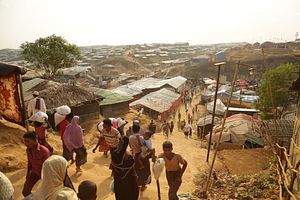Last week, Myanmar and Bangladesh announced they would soon begin repatriating the first batch of Rohingya refugees, in a move that came as something of a surprise to international nongovernmental organizations, foreign governments and, not least, the Rohingyas themselves.
In the crowded refugee camps of Cox’s Bazar, rumors run rife and fears of refoulement are high.
A list of 3,540 individuals has reportedly been cleared by both governments, whittled down from an initial list of over 20,000.
Both Myanmar and Bangladesh are under pressure to act, but previous announcements of this sort have failed to deliver. For the international community to support returns, conditions must allow for them to be “safe, dignified and voluntary.” To send Rohingyas back at this juncture would be none of those things.
Almost two years on from the August 25, 2017 militant attacks that precipitated the Myanmar military’s second wave of ethnic cleansing, Rakhine state remains unstable and volatile. Over 1,000 people have fled to Bangladesh since the beginning of the year.
Heavy fighting between the Myanmar military, called the Tatmadaw, and the Arakan Army has spread across the state, and a government-imposed mobile internet blackout is in place, severely curtailing the flow of information. Rights groups say they have credible information that war crimes are ongoing. Humanitarian access is severely hampered, and media access is minimal.
Over 100,000 Rohingyas remain in internally displaced persons (IDP) camps that by now probably warrant the use of the term “internment” — Rohingyas were banished there in 2012. Hundreds of thousands remain effectively interned in villages under choking movement restrictions, unable to access healthcare, education, and livelihoods. This entrenched apartheid is something the Myanmar government has yet to even begin to meaningfully tackle.
Most Rohingya refugees pointed to the lack of resolution around the issue of citizenship as a major barrier to return. They have reason to be wary: In the parts of the state where citizenship initiatives have been rolled out, the granting of paperwork has made little material difference to people’s lives.
None of which is to say Myanmar and Bangladesh wouldn’t be able to find Rohingyas who are willing to return. In a survey Xchange conducted in 2017, we found that 6 percent would return unconditionally.
Some 78 percent of respondents would return to Myanmar if the security, welfare, and/or political situation improved, and 16 percent would not under any circumstances.
The logistical details on the current return scheme are murky. Beyond the securitized prefab reception centers Myanmar has built in anticipation of returns, it is not clear where returnees would go — after all, most of their villages were torched and razed.
A leaked ASEAN Emergency Response and Assessment Team (ASEAN-ERAT) report recently suggested that returnees could return to their original houses (if they were “still habitable”), that they could move to relocation sites, or rebuild their own homes in “identified areas” — which raises major questions over residual land-ownership.
ASEAN-ERAT reported that military trucks would be made available “to transport returnees from the Reception Centre to the Transit Centre.”
However, this suggestion was nixed on account of the poor optics: “after considering the sensitivity of using the military trucks, the Government of Myanmar has reconsidered and will use the twenty (20) civilian trucks donated by the Government of China.”
The current stalemate over repatriation is just the latest twist in a decades-long dance. It bears remembering that previous waves of displacement have never been resolved — indeed, some refugees we interviewed had spent their lives being shunted back and forth across the border.
For now, though, it would be unconscionable for the international community to support returns.
Given all of the factors mentioned above, it seems unlikely that repatriation will start on a large scale. However, as we’ve seen in years gone by, periodically announcing returns gives each country the opportunity to appear cooperative, but blame the other when it inevitably doesn’t work out.
In the meantime, both governments need to do one thing as a matter of some urgency: talk to the Rohingyas.
Christopher Catrambone is the chairman of family-owned Tangiers Group and currently serves as director of humanitarian research organization Xchange.

































